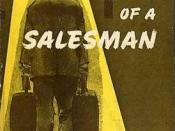In your opinion, as clearly and concisely as you can, what does Biff learn in Death of a Salesman.
In Death of a Salesman, Biff learns who he really is. In Death of a Salesman Biff realizes that his whole life he has been pursuing his father's ambitions. Biff naturally adopted Willy's ideals as a child, when Biff loved and respected Willy. It never occurred to Biff that his values and morals should reflect his own character. Biff did not know what he wanted to achieve in his future, and he didn't know who he really was in the past. Biff had to clear the deceptive fog, cast by his father, to find himself.
Early in the play, you discover Biff struggling with the future. Biff confides in his brother and admits "[He doesn't] know -- what [he's] supposed to want."(22) Biff thinks he is "...mixed up very bad...
[he's] not married, [he's] not in business." (23) Biff has learned from his father Willy, that a man, in order to be successful, must flourish in business. It is Willy's belief that a labourer is a failure. To have to work with your hands for a living is a disgrace. Biff "... spent six or seven years after high school trying to work [himself] up. Shipping clerk, salesman, business of one kind or another."(22) Biff thinks this sort of life is ".. a measly manner of existence... when all [he] really [desires] is to be outdoors, with [his] shirt off." (22) Biff knows he is content spending his time working in the country, using his hands, playing with horses. He knows he wants to be working on the ranches, but he's "... thirty-four years old, [he] oughta be makin' his future."(22) If Biff does not find a place for him to belong in the business world, he will be an embarrassment to his father. Happiness is not valued by Willy if it is unaccompanied by popularity, success, and wealth. Willy has instilled these beliefs in Biff and it's the reason Biff is so confused about his future.
Willy always aimed to raise his boys to be "... rugged, well-liked, all-around."(49) Biff was always receiving praise from his father. Willy always bragged how well Biff played football, how well-built he was, and how exceptionally Biff simonized the car. All of Willy's praises effected Biff. Biff, to his disadvantage, became overly confident. Willy taught Biff "... the man who makes an appearance in the business world, the man who creates personal interest, is the man who gets ahead. Be liked and you'll never want."(33) Biff believed that he had all of the qualities that he needed to be successful. Biff thought because he had so many attractive qualities by nature, his future success was assured. After some time Biff realized that he was never fated to be a business man. Later, Biff blamed his failures on his father claiming that he "... never got anywhere because [Willy] blew [him] so full of hot air [he] could never stand taking orders from anybody!" (131)Biff believed that because he was well-liked he could say and behave anyway he chose. He thought he could take what he pleased and nobody would say anything because he was well-liked. After Biffs meeting with Oliver, Biff realized how wrong he was about so many things. That day Biff realized he was "...a dime a dozen...nothing..."(132) All his life Biff believed that he would be a success, a leader of men. Willy waited for Biff to bring home prizes. As a teen, Biff had shown potential. Biff had scholarships to three university's, other boys at his school followed him around and obeyed his every order. Biff was a beloved salesman for Oliver, only really, he never was a salesman. All this time, he "... believed [himself] that [he'd] been a salesman for him! And then [Oliver] gave [him] one look and -- [he] realized what a ridiculous lie [his] whole life has been! [They've] been talking in a dream for fifteen years. [He] was a shipping clerk."(104) He stole Oliver's pen, and he had no right to. Biff, knowing what he had just done was wrong ran down eleven flights of stairs and suddenly "... stopped in the middle of that building and [he] saw -- the sky. [He] saw the things that [he loves] in this world. The work and the food and the time to sit and smoke. And [he] looked at the pen and said to [himself], what the hell am I grabbing this for? Why is [he] trying to become what [he] doesn't want to be? What is [he] doing in an office, making a a contemptuous, begging fool of [himself], when all [he wants] is out there, waiting for [him] the minute [he says he knows who he is]!"(132) Now he can. In the play Death of a Salesman, Biff realizes what is important to him. Biff learns that by standing by what is important to him will bring him gratitude. Biff always knew what he wanted in his heart, but feared that he was selling himself short and would disappoint his father.
BIBLIOGRAPHYDeath of A Salesman, Aurther Miller, Penguin Books 1976





